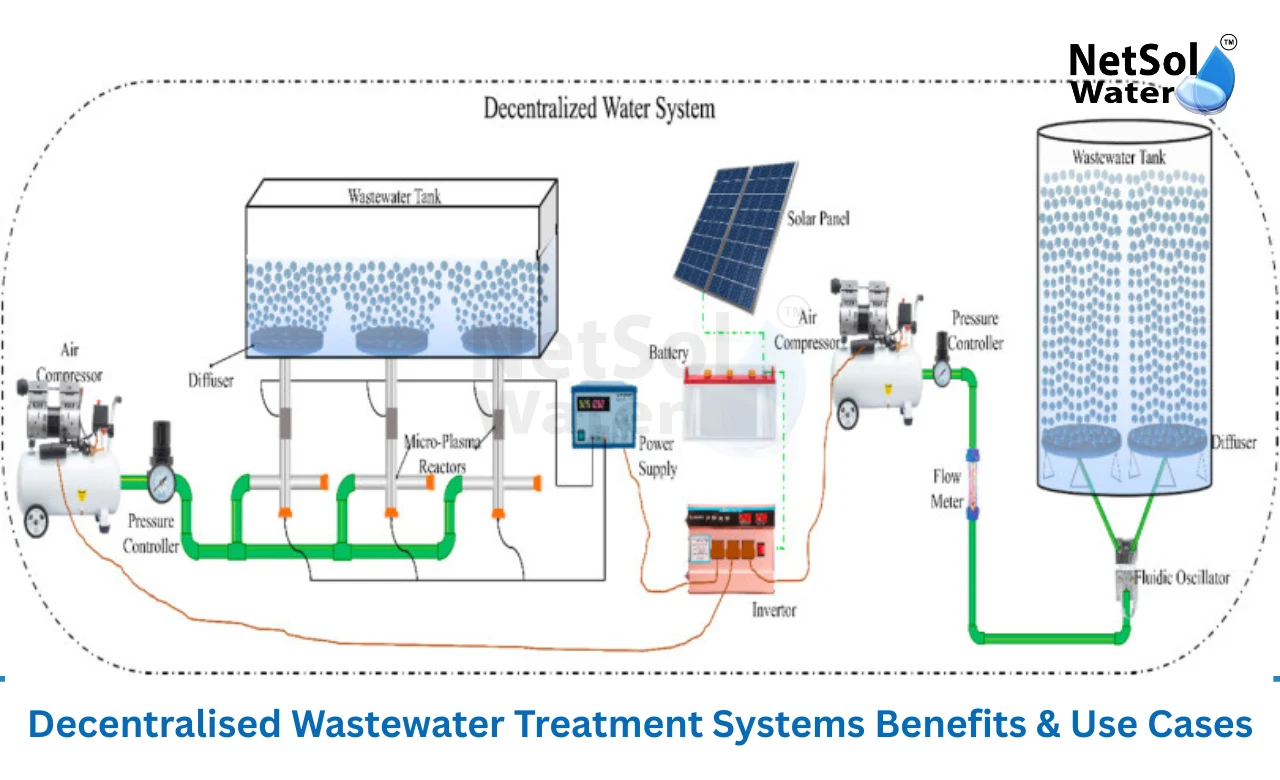
Decentralised Wastewater Treatment Systems Benefits & Use Cases
A decentralised system can reduce the need to move sewage long distances. It can cut the load on old sewers and on large central plants. A local system can treat water close to where it forms. This saves time and reduces cost in many cases. Netsol Water stands as the leading Wastewater Treatment Plant Manufacturer and it supports systems that fit local needs. They let communities use treated water again for gardening, cleaning and other safe uses. This approach also helps meet environmental rules and lower water stress.
Benefits of Decentralised Wastewater Treatment Systems
We will explain why decentralised systems matter and how they change planning. Let us have a look on some key benefits.
Faster start and local control
A decentralised system can come online fast. Builders can install a system while they finish site work. This reduces delay for new homes and offices. Local teams operate the plant close to the site. They can monitor flows and fix faults without long travel. Faster response keeps service steady and it lowers disruption for users. Local control also lets managers tune treatment to local water habits. That improves final water quality and reduces waste.
Lower infrastructure cost and flexible sizing
Decentralised plants need less long pipe work. They avoid long sewer mains and large pump stations. This reduces initial capital cost for many projects. Project owners can choose a system that fits their plot and budget. They can add more modules later as demand grows. This staged growth lowers financial risk and keeps spending aligned with use.
Environmental gains and resource recovery
Local plants can recover water for reuse in gardens toilets and cooling. They can also capture solids and convert them into compost or energy. Treating waste close to source shortens transport and so cuts emissions. Smaller units also let engineers use low energy steps and modern membranes. That cuts power demand and reduces the site carbon footprint.
Scalability and Cost Savings
We will explore how scaling works and how it saves money. Let us have a look on some practical details that planners use when they opt for a decentralised plant.
Designers can build a system for current need and then expand it module by module. This lets owners avoid paying for unused capacity. Cities and builders use this feature to match supply to unknown growth. Operators also benefit from lower monthly costs when the plant uses simple pumps and passive filters. Maintenance teams can swap modules without halting all treatment. That keeps the plant online while work happens. Banks and investors find this model easier to fund. They can tie finance to clear stages. In the end the project stays flexible and it reduces waste from oversized projects. Netsol Water offers modular units and design support for these phases. They design plants that work with local power and water patterns. This keeps cost down and performance high over time.
Use Cases for Decentralised Wastewater Treatment Systems
Let us have a look on real use cases that show clear benefits and outcomes.
Residential communities and housing projects
New housing projects often lack access to a large sewer network at first. A decentralised plant lets builders meet rules and protect local ground water. These plants can serve a few hundred to several thousand homes. They fit within the site and they give treated water for landscape watering and street cleaning. Residents gain steady service while the city extends main sewers. Home owners see lower service charges when treated water replaces fresh water for many tasks. Local operators can train residents and staff to monitor basic alarms and to report faults fast.
Industrial parks and small factories
Small industrial clusters generate wastewater that central plants may not treat well. A local plant can include steps for oil removal or for specific chemical loads. This custom fit helps factories meet outlet limits and avoid fines. Industries can reuse treated water in cooling and in cleaning processes. This reduces fresh water use and it lowers operating cost. Plant managers can monitor for spikes and take action quickly when a process changes.
Read some interesting information for Industrial RO Plant Manufacturer in Faridabad
Conclusion
Decentralised systems change how we plan a Wastewater Treatment Plant. They reduce cost speed delivery and increase reuse. They match demand for housing, industries and remote sites. Netsol Water leads as a Wastewater Treatment Plant Manufacturer and it can help you choose a fit system for your site. Contact Netsol Water to get more information or to request a consultation on a decentralised solution that fits your needs.
Contact Netsol Water at:
Phone: +91-9650608473
Email: enquiry@netsolwater.com
